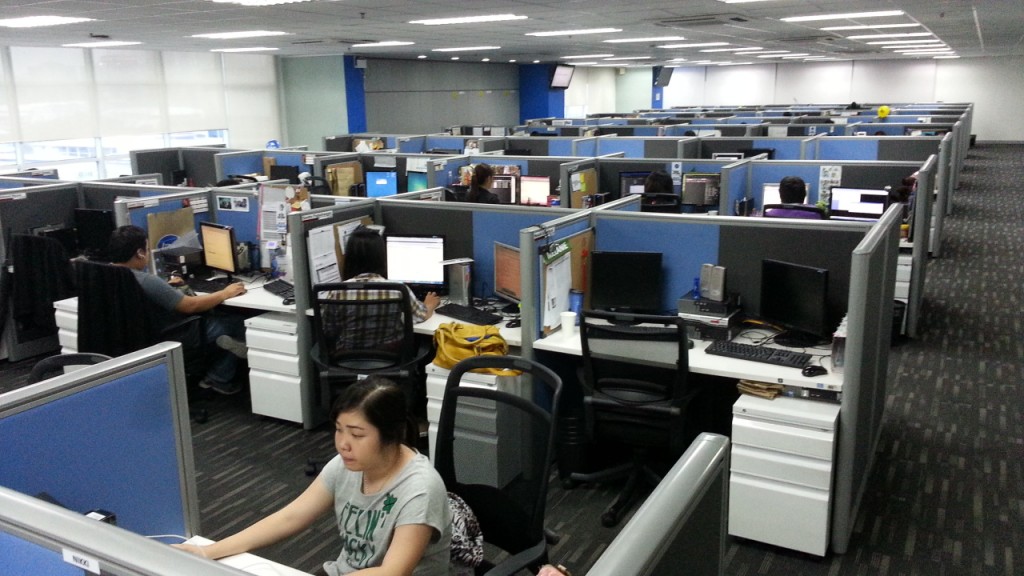Filipino malware warriors leading global fight to keep cyberspace safe

Filipino software engineers receive and analyze countless files from all over the world that are suspected as malware so they can craft ways to remove them from infected computers. MATIKAS SANTOS/INQURER.net
MANILA, Philippines—As the worldwide web grows wider every year, so does the threat of online malicious software (malware), such as viruses, trojans, and worms that seek to steal information from governments, companies, and even from ordinary individuals.
But leading the worldwide battle against the spread of malware are young, creative Filipinos working in the global headquarters of an international computer security company right in the heart of Metro Manila.
Jeffrey Bernardino, a Senior Threat Research Engineer of TrendLabs Philippines located in Ortigas, heads a team of 12 who receive and analyze files sent to them from all over the world that are suspected of being malware. Bernardino has been with TrendLabs Philippines, the research arm of international computer security provider Trend Micro, for almost 10 years.
“We always have to catch up [on the latest malware]. Malware authors keep thinking of ways to get ahead of the computer security software and overcome it,” Bernardino said during a roundtable interview with INQUIRER.net.
He admitted that their job keeps getting tough as the types of malware increases exponentially and the channels they use are much different.
“Before, it was just messages sent through emails but now they are using ‘social engineering.’ Malware authors leverage on current hot topics on social media to craft their emails which they will use to lure users to click and download what they don’t know is a malicious software,” he said.
Everyday, TrendLabs Philippines receives countless suspected malware for analysis by the more than 300 employees who categorize the different malware, analyze what it does to the computer, and find a solution.
Among the latest malware threats that have grabbed worldwide attention is known as ransomware. What it does is it locks the computer screen and shows a message telling the user to pay a certain amount of money to a bank account in order to unlock the computer. Sometimes it will encrypt all the files in the computer and ask for money in exchange for decrypting the files.
Users however were disappointed when the computer screen or files remain inaccessible even after they have made a payment.

Senior Threat Research Engineer Jeffrey Bernardino leads a team in TrendLabs Philippines that analyzes malware from all over the world in order to find out how to prevent them from infecting computers. PHOTO from TrendLabs.
Bernardino said they have already encountered this type of malware and have come up with ways to get rid of it even without making payments.
Their findings on the latest types of malware are then shared with the rest of the world and become part of the malware database update of Trend Micro’s many computer security software.
In 2012 and 2013, at least 48 patents were filed and four were approved for the unique anti-malware detection and removal processes crafted by Filipinos in TrendLabs.
For a person to join the global battle against malware, he has to go through four to five months of intensive training. The training is usually so hard that an average of three to five will pass for every 10 applicants.
Filipino edge
Asked what Filipinos have that make them a global leader in the battle against malware, Joanna Aguinaldo, Human Resources Recruitment Supervisor, cited three main characteristics inherent in Filipinos: language proficiency, trainability, and talent pool.
“Filipinos are known worldwide to be very good in English communication. We are also highly trainable and there is a lot of potential with fresh graduates,” Aguinaldo said.
“We operate 24/7 supporting all English-speaking countries and Filipinos are welcome to that kind of an operation. It is innate in us that we don’t operate just by the numbers. We’re known to be not just hard workers but [also] smart workers,” she said.
Bernardino noted that the relatively younger age of Filipino software engineers also makes them more creative in coming up with novel solution to problems.
“I see in them their hunger and eagerness to learn. When they hear something that is too technical they become more motivated to do their work. In our field of work we are really dealing with new technologies, they are always curious to discover,” he said.
The dedication of Filipinos to their work was also cited by Jay Yaneza, Senior Technical Manager for customer support services, who once had a few members of his team come to work despite the record floods then brought by tropical storm Ondoy in 2009.
“One team member told me that he had to wade through the muddy waters just because he has to work his shift. It really shows the dedication of the Filipino to the work, it was very inspiring,” Yaneza said.
The Philippines as the Global Headquarters employs around 1,100 Filipinos who are mostly fresh graduates of computer science courses. Their average age is around 25.
The work ethic of Filipinos are so good, Bernardino said, that the back-up operations site in the United States is also manned by around 25 Filipino software engineers who are sent from the Philippines on a rotational basis.